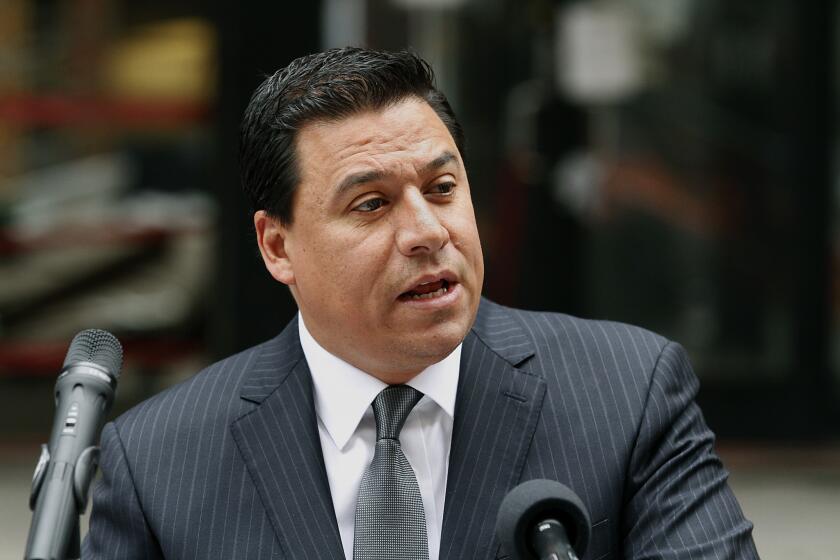How Jose Huizar’s lavish Las Vegas jaunts tripped alarms for FBI in L.A. bribe case
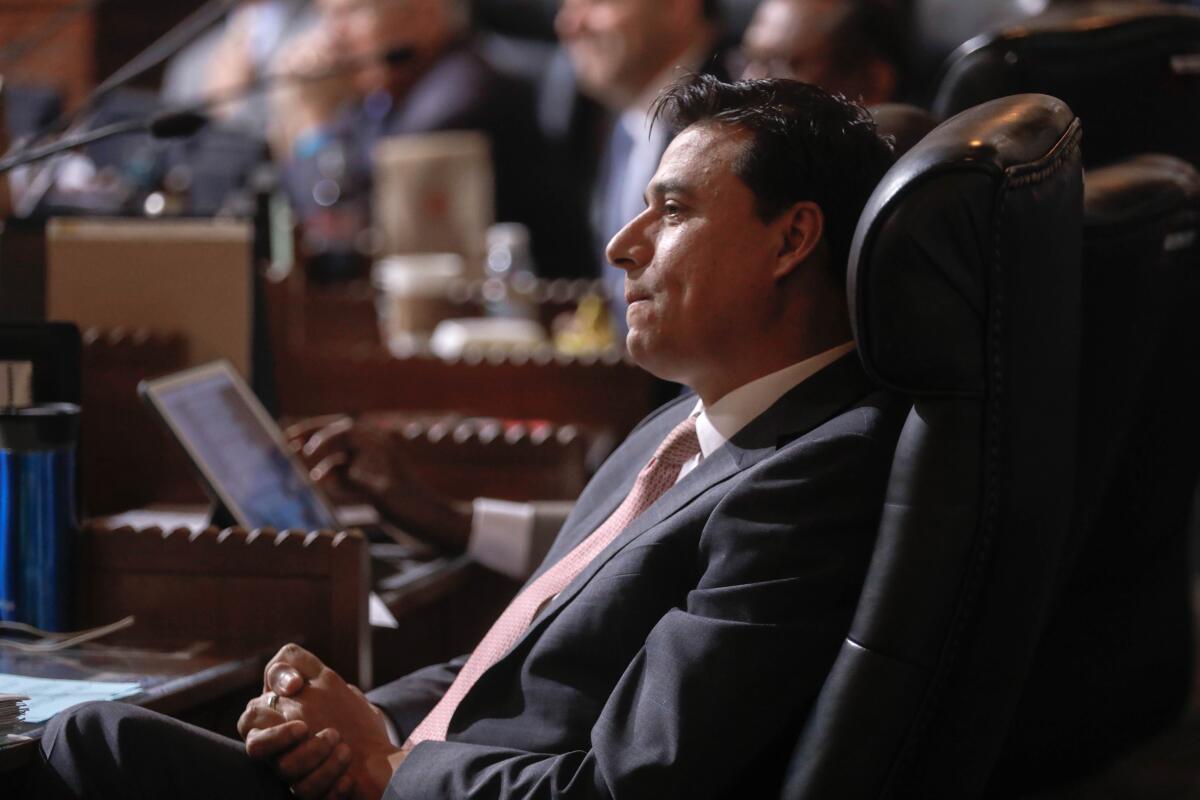
Las Vegas casinos pamper their big spenders with loads of perks, and the $13 million Wei Huang had lost gambling at the Palazzo made him a coveted “whale” of a customer. So the casino charged him nothing to fly on its private jet and stay in its presidential suite overlooking the Strip.
But when Palazzo security learned one day in July 2015 that the billionaire developer was bringing Los Angeles politician Jose Huizar to Las Vegas that night on the resort’s luxury Gulfstream IV, it set off alarms.
Get the lowdown on L.A. politics
Sign up for our L.A. City Hall newsletter to get weekly insights, scoops and analysis.
You may occasionally receive promotional content from the Los Angeles Times.
As a City Council member, Huizar was what casinos call a “politically exposed person.” He could gamble at the Palazzo only after filing papers showing he was not using public funds.
Palazzo dealers kept close watch on Huang and Huizar when they arrived hours later in Parlor 8, a room for high rollers who typically bet with $25,000 and $100,000 chips.
What they discovered triggered an FBI investigation that brought to light a sprawling corruption scandal at Los Angeles City Hall. Federal prosecutions so far have put another City Council member in prison and yielded four other felony guilty pleas.
L.A. City Councilman Jose Huizar faces additional charges expanding on allegations that Huizar leveraged his power over real estate development for illicit gain.
Details of the cat-and-mouse drama that unfolded at the Palazzo that night are spelled out in an FBI affidavit that was recently made public and was at the center of a court dispute over a search warrant for Huizar’s emails.
Huizar is awaiting trial on charges of running an extortion racket that shook down developers of top-tier properties in downtown Los Angeles.
The casino chips, prosecutors say, were part of more than $800,000 in bribes that Huang paid the councilman in an attempt to win city approval of a 77-story tower that aimed to be the tallest on the West Coast. It was never built.
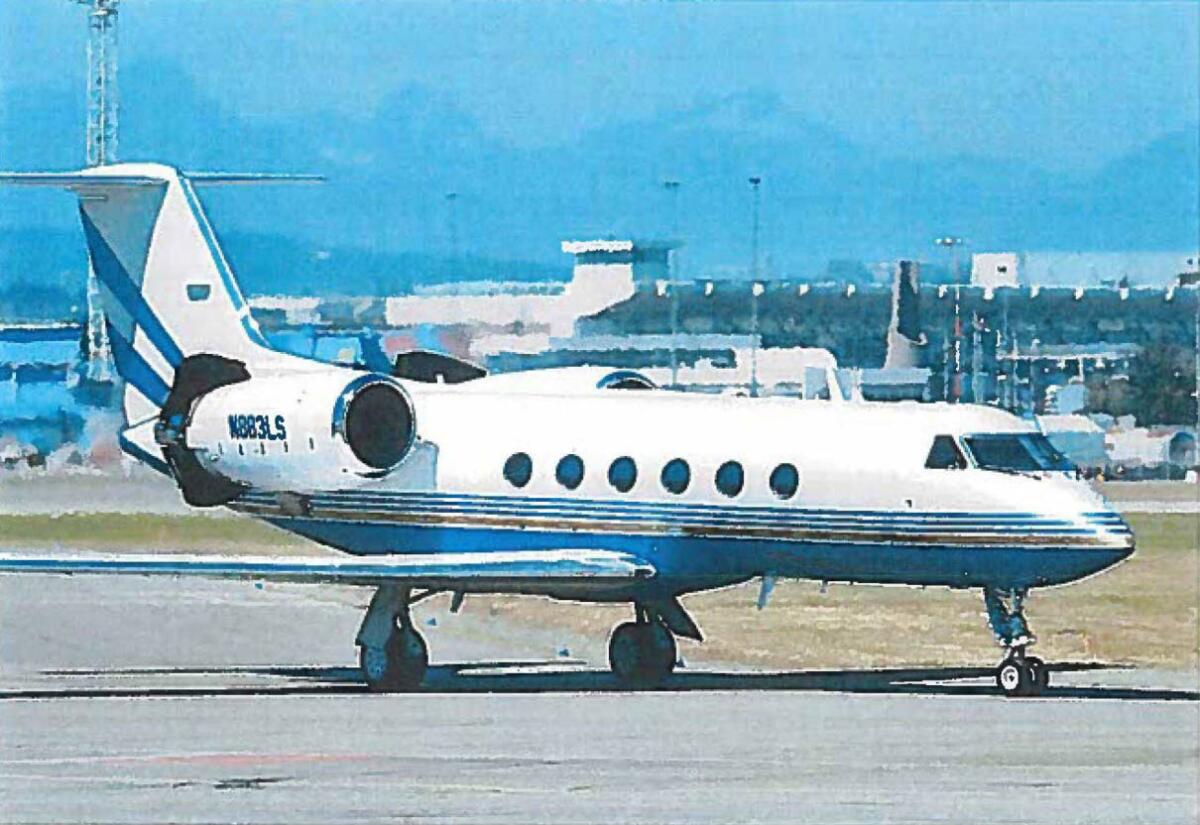
Huizar has pleaded not guilty. His lawyers say the councilman, while dealing with Huang, did not engage in the type of “official acts” that would constitute a federal bribe. For all of the benefits Huang is alleged to have given Huizar, “remarkably little was flowing in the other direction,” they said.
Huang, now a fugitive charged with bribery and other crimes, could not be reached, but an arm of Shenzhen New World Group, his development company, is contesting charges it participated in the alleged schemes.
“We strongly disagree with the government’s assessment of the facts, but everything we have to say about the government’s claims will be presented in court,” company lawyer Richard Steingard said.
In the recent court fight over the search warrant, Huizar’s attorneys attempted to block prosecutors from using his personal emails as evidence at the trial, which is set for October.
Subscribers get early access to this story
We’re offering L.A. Times subscribers first access to our best journalism. Thank you for your support.
U.S. District Judge John F. Walter rejected their argument that the FBI’s July 2016 application for a warrant to view Huizar’s Yahoo email account failed to show that the search was likely to yield evidence of bribery and had therefore violated his rights.
In the wrangling over the warrant in court filings, colorful details emerged of how the sleuthing of Palazzo’s security team sparked the investigation.
By the time Huang and Huizar arrived at the gaming tables in Parlor 8 on July 7, 2015, the developer was well known to managers of the Palazzo, a hotel and casino in the Venetian Resort.
He was chairman of Shenzhen New World Group, then owner of two major Los Angeles hotels: the Sheraton Universal and a former Marriott at West 3rd and South Figueroa streets, where he would later propose the 77-story skyscraper.
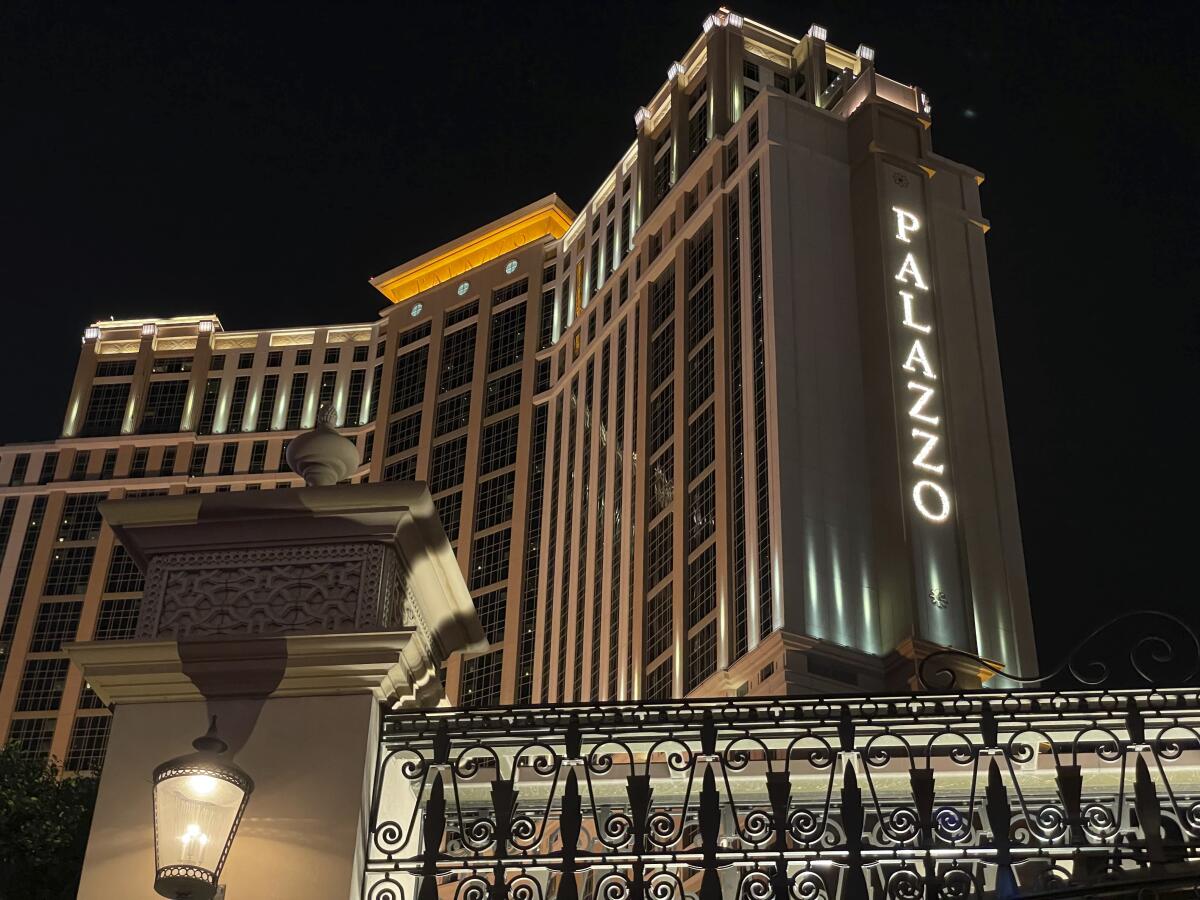
Huang had stayed at the Palazzo four times over the previous year. Each time, he reserved the vast presidential suite with an Italian-marble foyer, grand piano, massage parlor, bar and dining room. The $7,000 nightly rate was waived as part of $6 million in comps the Palazzo gave Huang, according to the FBI.
With Huang and Huizar arriving soon on the jet, Palazzo staff looked up the councilman in the casino’s records. They realized he had gambled at the Palazzo on the same nights as Huang on the developer’s previous visits, but had not filed the “politically exposed person” disclosures known as “PEP” papers.
No room had been reserved in the councilman’s name for those stays, and it was unclear whether he’d stayed in Huang’s suite, according to the FBI. Prosecutors say that Huang regularly offered Huizar hotel rooms, expensive spa treatments and prostitutes for four years, but have not specified whether he accepted them.
Many of the allegations against Jose Huizar laid out by prosecutors have been described in previous court filings. But there are some new allegations.
On three of Huang’s Palazzo trips, casino security found, Huizar had flown with him on the hotel jet, part of a small fleet of planes that the resort’s parent company, Las Vegas Sands Corp., used to transport VIP guests.
And they found Huizar had never bought any of the casino’s gambling chips; his “total lifetime drop” at the Palazzo was zero. Yet he’d cashed out $36,500 in chips that someone else had bought and taken the money, according to the FBI.
All told, prosecutors now say, Huang had already given Huizar more than $53,000 in Palazzo chips to play before the July trip. And in the months that followed, they say, the developer would ply Huizar with $141,000 in additional chips during more visits to Las Vegas at Caesars Palace, the Cosmopolitan, the Wynn casinos and back at the Palazzo.
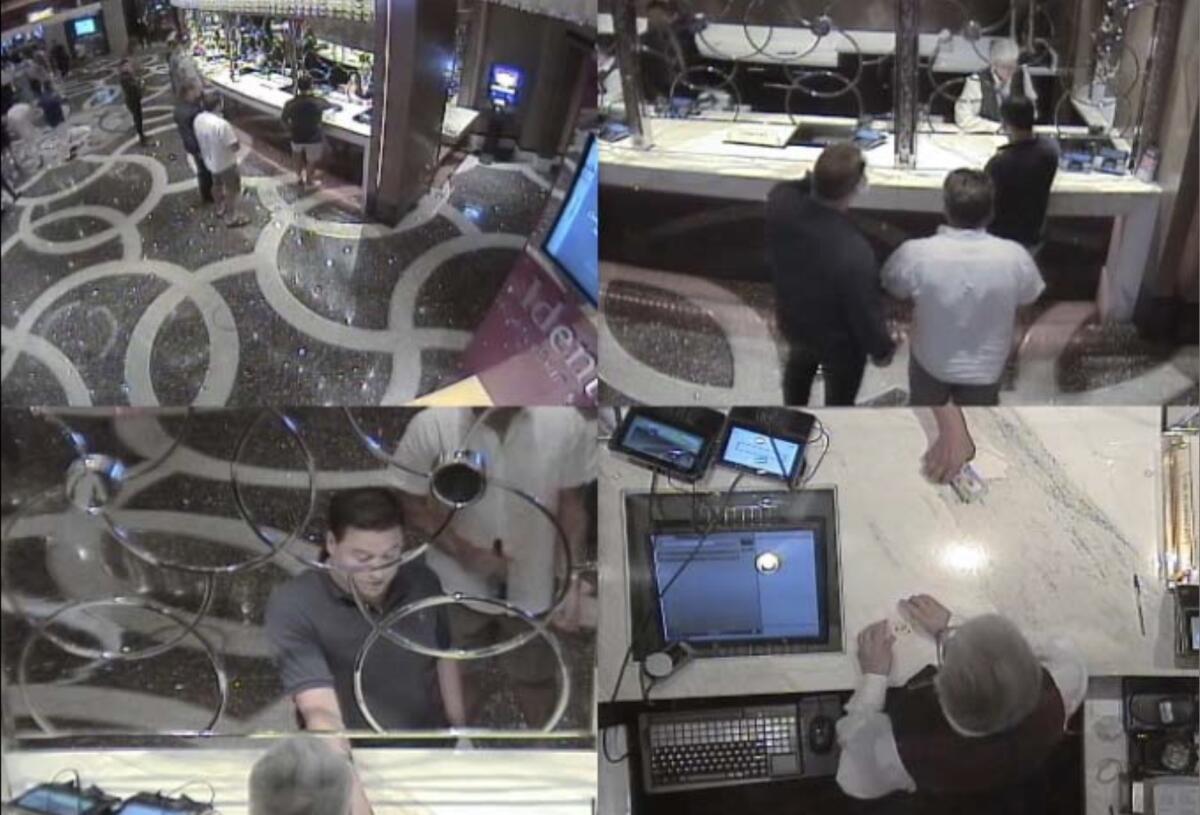
With Huizar expected back at the Palazzo’s gaming tables that July evening, casino managers entered his name into a computer system to alert dealers if he tried to use his player’s card — a card casinos use to reward gamblers with points they can redeem for comps. This time, he would need to make a “PEP” declaration.
Stephen Fryson, the evening shift manager overseeing the Palazzo’s dealers and pit managers, set up Huang’s playing area in Parlor 8. Huang arrived with Huizar and a few others.
Dealers saw Huang pass $65,000 in chips to Huizar that night, according to the FBI, so the casino started tracking the councilman’s use of the chips.
When Huang took a dinner break, Huizar left the room as well. A pit manager noticed he left behind nearly $18,000 in chips at a table he could return to later.
While Huang headed upstairs to dine at an exclusive club, surveillance video later reviewed by the FBI showed Huizar made his way to the main casino floor with his special assistant George Esparza and Ricky Zheng, the executive director of Huang’s development firm.
Huizar handed his player’s card to the dealer at a gaming table. The dealer swiped it and saw the alert. Fryson dispatched a senior credit executive to the casino floor with PEP papers for Huizar to fill out.
L.A. City Councilman Jose Huizar was arrested Tuesday in a federal investigation into corruption at City Hall.
Huizar “looked over the PEP paperwork twice and refused to fill out the paperwork both times,” FBI agent Andrew Civetti reported later in his warrant request. The executive got the impression Huizar was trying to “stay under the radar,” Civetti wrote.
Fryson escorted Huizar off the casino floor. On the way out, he let Esparza — who later pleaded guilty to racketeering conspiracy — cash out $50 in chips.
After dinner at the Paiza Club, Huang returned to Parlor 8, where he played the $17,800 in chips that Huizar had left on the table.
Two weeks later, Jonathan Solomon, then global chief compliance officer at Las Vegas Sands Corp., notified the FBI’s Los Angeles field office of “suspicious activity” between Huizar and Huang at the Palazzo.
With that, the FBI says, the corruption investigation began.
More to Read
Sign up for Essential California
The most important California stories and recommendations in your inbox every morning.
You may occasionally receive promotional content from the Los Angeles Times.
